-
Saturday, 14 July 2018
Ernesto Giménez Caballero / Edgar Neville
Ernesto Giménez Caballero
Esencia de verbena (The Essence of Verbena), 1930
Spain, b/w, original version (shot silently and post-synchronised with a voice-over by Giménez Caballero), 11’Edgar Neville
Domingo de Carnaval, 1945
Spain, b/w, original version, 77’Opening concert by Variedades Azafrán.
Esencia de verbena is an urban symphony, akin to those filmed on Berlin, Paris and Moscow at the end of the 1920s, depicting Madrid through the typical local verbena festivities held in its neighbourhoods. (Edgar Neville)
“Domingo de carnaval is a one-act farce in Madrid, in which a murder plot is interwoven; a storyline in which a police-type mystery intervenes; but it is, above all, an etching, or rather, a moving Solana painting. The action takes place in El Rastro market over the three days of Carnival in 1917 and 1918, with a grotesque crowd with masks of all kinds that move and convulse on a backdrop as thrilling as El Rastro. Some scenes take place at the top of the Pradera de San Isidro, the Goyaesque profile of Madrid in the background. Lastly, I hope everything has that bustling joy of Goya’s The Burial of the Sardine” (Edgar Neville)

-
Friday, 20 July 2018
José Antonio Nieves Conde
Surcos (Furrows), 1951
Spain, b/w, original version, 100’Presented by: Memorias en red. Impresiones, a research association that works with studies of memory and spaces of encounters for Lavapiés residents who want to share their experiences, memories and affections.
A family moves from the country to the city in search of better living conditions. “I was presented with this story, which was if anything Arnicheseque, but with the crucial intervention of Gonzalo Torrente Ballester we turned it into a social consideration… Surcos was put together in a way that is now commonplace in French and Italian cinema: with background information. We compiled photographs and interviews for over a month, and dressed the actors in the clothes the local residents actually wore… Even the outdoor scenes were filmed with direct sound”. (José Antonio Nieves Conde).

-
Saturday, 21 July 2018
Luis García Berlanga
El verdugo (The Executioner), 1963
Spain, b/w, original version, 91'Presented by: PAH Centro, a Platform for People Affected by Mortgages in the Madrid neighbourhoods of Austrias-Letras, Lavapiés, Arganzuela and Malasaña, and Sindicato de Inquilinas e Inquilinos, an organisation which defends tenants’ rights.
In the guise of a satire about the death penalty during the Franco regime, Berlanga and Azcona created an in-depth and heart-breaking depiction of moral misery in a country which is at once infantilised and repressed. José Luis and Carmen, an executioner applicant and his daughter, dream of leaving the congested neighbourhood of Lavapiés –a marriage and a cosy little apartment on the outskirts in exchange for committing to the cruelty of the Dictatorship. The horizon already forebodes the consequences of this submission, part and parcel of the Transition: tourism and the rampant growth of construction are the economy’s only driving forces.
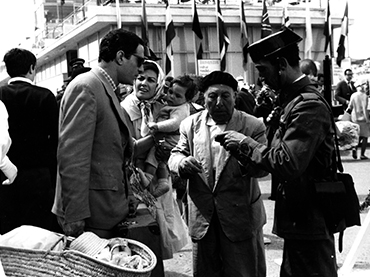
-
Friday, 27 July 2018
Fernando Colomo
Bajarse al moro (Going Down in Morocco), 1989
Spain, colour, original version, 83'
Presented by Fernando ColomoIn an adaptation of the eponymous play by José Luis Alonso de Santos, the endeavours to rework the performance space result in a profusion of images from the Lavapiés neighbourhood, furnished with characteristics that would shape its mythology in the years that followed: a free and accommodating area, where youth is provisionally elongated until there is no choice but to settle down. This film is one of the richest and longest-lasting works on bohemia that defined the area, and which today is becoming ever more difficult to find.
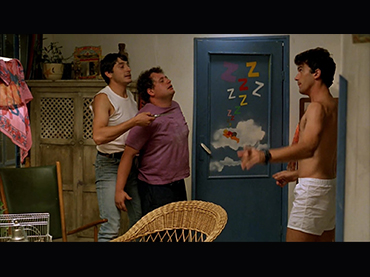
-
Saturday, 28 July 2018
Basilio Martín Patino
Paseo por los letreros de Madrid (A Walk Around Madrid’s Street Signs), 1968
Spain, b/w, original version, 15'Madrid, 1987,
Spain, colour, original version, 110'Presented by: Plataforma de Fiestas Populares de Lavapiés, an ensemble of associations, collectives and local residents calling for mixed and diverse street parties.
This session opens with the first short film by a young film-maker who, new to Madrid, unsuccessfully attempted to unsnarl the history and identity of the city by exploring the naming of its streets.
“Madrid is the country’s capital and an indifferent host to its governing powers [...] It’s as though its apparent resignation to live in discord has developed overt escape mechanisms which are completely unrelated to the regional pretensions of other regions with a different historical conscience. It’s a muted discord that endures and is willing to throng the streets and squares again with the strange instinct of something extraordinarily human that re-touches inner fibres. With the certainty that a film camera will be, and will continue to be, in any corner recording certain gestures and indicating something more than local authenticity; in order for its collective speech not to end up being lost in the vacuum of time”. (Basilio Martín Patino).

-
Friday, 3 August 2018
Francesco Rosi
Las manos sobre la ciudad (Hands on the City), 1963
Italy, colour, original version with Spanish subtitles, 101'Presented by: Darío Corbeira, artist and founding member of the artists’ collective La familia Lavapiés (1975-76).
Set in Naples, Rosi’s home town, the film explores the relationship between the physical make-up of the metropolis and its invisible power structure, laying bare the rotting foundations of both. Real-estate developer Édoardo Nottola plans to build skyscrapers with the blessing of City Hall — where Nottola is also conveniently a councillor. However, the fatal collapse of a block of flats forces alliances to be redressed, with the ideology, not to mention the morality, of the calculated risks the last thing on the councillors’ minds. Hands on the City is one of the bluntest historical manifestations of the thick weft of gentrification.
![Francesco Rosi. Le mani sulla città [Las manos sobre la ciudad], 1963 Francesco Rosi. Le mani sulla città [Las manos sobre la ciudad], 1963](https://recursos.museoreinasofia.es/legacy_programs/6_6.jpg)
-
Saturday, 4 August 2018
Alberto García Ortiz and Ágatha Maciaszek
A ras del suelo (At Ground Level), 2003
Spain, colour, original version, 95'Presented by: Alberto García Ortiz and Ágatha Maciaszek
The camera pans through the streets of Madrid’s Lavapiés neighbourhood, immersed in an eye-catching process of redevelopment, to focus on the daily turn of events for different residents and their acts of protest against the local authorities, and on the daily encounters between the characters, filmed low down, ‘at ground level’. An out-of-reach health centre, fake-smile, close-fisted politicians, a TV churning out news behind reality’s back, citizens that give free rein to local knowledge despite their poor living conditions. This film is an example of street-level neighbourhood cinema.
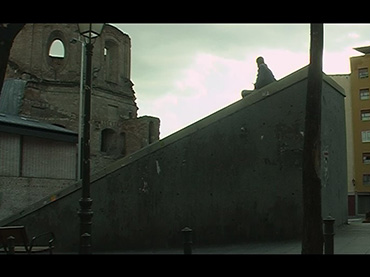
-
Friday, 10 August 2018
Dan Ollman, Sarah Price and Chris Smith
The Yes Men, 2004
USA, colour, original version with Spanish subtitles, 83'Presented by: Jesús Carrillo, art historian and a member of Lavapiés artists’ collectives such as La fiambrera obrera. He is also the author of the book Space Invaders. Intervenciones artístico-políticas en un territorio en disputa: Lavapiés (1997-2004) (Brumaria, 2018).
The aim of The Yes Men is to call out corporations with parodies that turn the public’s attention towards their harmful and immoral practices. The idea of art as sabotage to dismantle our day-to-day, wielded by these artists/activists, is in tune with the interventions of different Lavapiés collectives in the late 1990s and early 2000s.
“When trying to understand how a machine works, it helps to expose its guts. The same can be said of powerful people or corporations. By catching powerful entities off guard, you can momentarily expose them to public scrutiny. This way, everyone sees how they work and can figure out how to control them. We call this identity correction”. (The Yes Men).
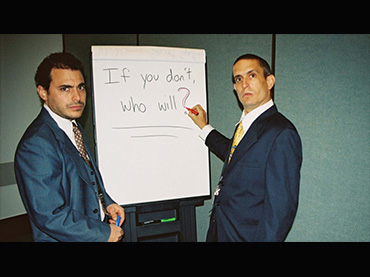
-
Saturday, 11 August 2018
Eliane Caffe
Hotel Cambridge, 2016
Brazil, colour, original version with subtitles, 99'Presented by: Sabela Fondevila Estévez, a local resident involved in migrant struggles in Lavapiés.
In 2012 the abandoned Hotel Cambridge building was occupied by MSTC (Movimento Sem-Teto do Centro). Inside the building live 170 families, not just from Brazil but also immigrants and refugees from countries like Bolivia, Haiti, Palestine, Cameroon and the Dominican Republic. Their way of organising goes beyond the obligations required to live together and continue squatting; here the creation of bonds is a priority. Film-maker and activist Eliane Caffe films community life in the hotel — the threat of eviction permanently looming — with a mix of professional actors and the actual residents.

-
Friday, 17 August 2018
Aki Kaurismäki
Toivon tuolla puolen (The Other Side of Hope), 2016
Finland, colour, original version with Spanish subtitles, 98'Presented by: Red Solidaria de Acogida, a citizen platform which defends human rights linked to people’s free movement.
In the latest film by one of the most important directors in recent times, a young Syrian refugee seeks asylum in Finland, but comes up against the cruelty and absurdity of the legal system. From this point on, he will have to live from the solidarity of others, characters that have featured heavily in Kaurismäki’s films, and who also face new first-world problems: the disappearance of certain trades, futile globalisation, isolation, a lack of empathy and cruelty as the predominant form of behaviour.
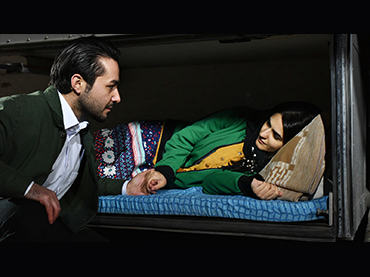
-
Saturday, 18 August 2018
Christian Rouaud
Tous au Larzac! (Leadersheep), 2011
France, colour, original version with Spanish subtitles, 120'Presented by: the people in charge of Muestra de Cine de Lavapiés, an event which screens free films in different spaces (squares, empty lots, bookshops, social centres, bars...) around Lavapiés every year in June and July.
This feature-length film recounts a struggle. In 1971, the announcement of the expansion of a military base signals the start of the ‘self-taught militancy’ of 103 male and female farmers who, under the threat of expropriation and to defend their land, change sides and join hippies and insubordinates with different ideologies. The Larzac Committees group together the left-wing working class and farmers, anarcho-syndicalists, Maoists, and Catholic farmers. An unconventional melange in which the assets of each group serve the common good, thus creating a productive anomaly that the Lavapiés community has likened to life in the neighbourhood.
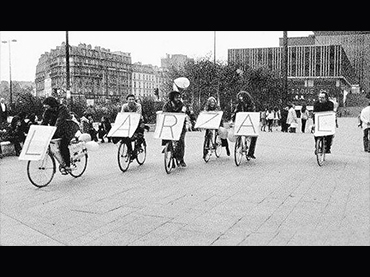
-
Friday, 24 August 2018
Fabrizio Terranova
Donna Haraway: Story Telling for Earthly Survival, 2016
Belgium, colour, original version with Spanish subtitles, 90’Presented by: Fabrizio Terranova and Fefa Vila, a professor of Gender Relations in Contemporary Society at the Complutense University of Madrid and a queer-feminist activist.
The main premise of the film is how activism is no longer linked to an idea or territory, but to the defence of diverse ways of life, amply demonstrated in Lavapiés in recent years. Haraway, an impassioned speaker, discusses this and other issues: capitalism and Anthropocene, science fiction as philosophical writing, unconventional sexual and family relations, the suppression of women writers, the relationship between species and the need for new post-colonial and post-patriarchal narratives: “With her inimitable brilliance and wit, Donna Haraway takes us on an exhilarating journey that combines sharp theoretical insights and moving personal moments. An intellectual giant comes to life as never before. Enjoy the ride!” (Rosi Braidotti).
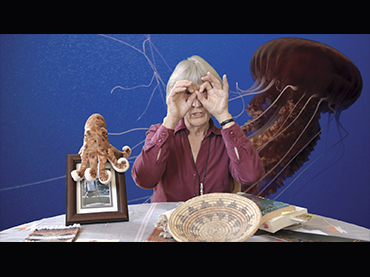
-
Saturday, 25 August 2018
Youssef Chahine
Al-Massir (Destiny), 1997
France-Egypt, colour, original version with Spanish subtitles, 138'Presented by: Pepa Torres, theologist, social educator and aid worker in migrant movements.
Destiny is Youssef Chahine’s vehement reaction to the attacks of Egypt’s Islamic fundamentalists after the censorship of his previous film Al-Mohager (The Emigrant) and the assassination attempt on his friend, the writer Naguib Mahfuz. Through an open interpretation of the life of Averroes, an Andalus philosopher, and with the spirit of classic adventure, Chahine demonstrates that fundamentalism is not exclusive to our era or to Islam, and nor is tolerance and intellectual curiosity exclusive to Europe. The film, a coda to the series, sets forth religious difference as a source of vital and intellectual wealth, in lieu of its associations with fundamentalism and misery, a common representation in the media.

Lavapiés, Lavapiés. Just Look at You Now
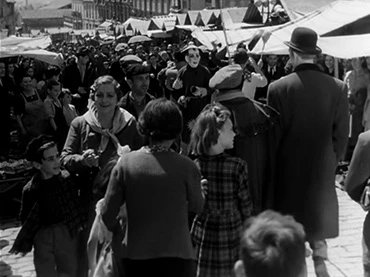
Held on 14, 20, 21, 27, 28 Jul, 03, 04, 10, 11, 17, 18, 24, 25 Aug 2018
This summer’s film season explores the idea of neighbourhood cinema as an open, local space, in which images prompt a dialogue on the history, local residents, aspirations and desires inhabiting Madrid’s Lavapiés barrio. Not only is this neighbourhood the home of the Museo, it is also an example of a historic quarter transformed by the complex dynamics of real-estate speculation and a large influx of tourists, a similar story in numerous international-scale city centres. Lavapiés, authentic and outspoken, refuses to fade, reaffirming itself again and again as a space of opposition and social reinvention. To put it another way, the neighbourhood it has always been.
The history of Lavapiés is the history of Madrid, but its most working-class, low-income, tumultuous and rebellious side, the town detached from the royal courts, the seat of power. The opening sessions in the series show early films which focus on and are shot in this neighbourhood: Lavapiés, tough and subversive (Esencia de verbena and Domingo de Carnaval); the first disembarkation point for rural exodus (Surcos), and abashed in its misery (El verdugo); its conception as a brittle paradise (Bajarse al moro) and a repository of rebellion and local memory (Madrid); the search for local resistance (A ras del suelo) where others only sniff get-rich-quick opportunities (Las manos sobre la ciudad).
The second half of the series moves away from Madrid, looking to other geographical and mental coordinates for its identity, unearthing the sprawling imagery and sensibilities that shape and mould the neighbourhood. The desires and limits of the capacity to embrace human beings (The Other Side of Hope and Hotel Cambridge); recollecting the junction between activism and contemporary art (The Yes Men); and, in the final stretch, extolled snippets of better worlds to which the cultures running through the neighbourhood have contributed: the creative defence of territory and ways of life from ideological and generational confluence (Tous au Larzac!); the experience of subjects, love and care demonstrated by ecofeminism and hacktivism (Donna Haraway: Story Telling for Earthly Survival); and the generous, open and united tradition of Islam (Al-Massir).
The films will be introduced by members of collectives, artists, and intellectuals – local residents, ultimately – who will relate their field of work with the theme of each session, illustrating the richness of the barrio’s associative network. The series opens with a concert by the group Variedades Azafrán and their contemporary take on authentic popular music from Madrid.
With the support of
Programme
Ana Useros and Chema González
Organised by
Museo Reina Sofía
Lavapiés, Lavapiés. Just Look at You Now
Más actividades

Difficulty. Forms and Political Effects of Deviation in Writing and Contemporary Art
23 February – 14 December 2026 – Check programme
Difficulty. Forms and Political Effects of Deviation in Writing and Contemporary Art is a study group aligned towards thinking about how certain contemporary artistic and cultural practices resist the referentiality that dominates the logics of production and the consumption of present-day art. At the centre of this proposal are the concepts of difficulty and deviation, under which it brings together any procedure capable of preventing artistic forms from being absorbed by a meaning that appears previous to and independent from its expression. By ensuring the perceptibility of their languages, difficulty invites us to think of meaning as the effect of a signifying tension; that is, as a productive and creative activity which, from the materiality of art objects, frees aesthetic experience from the representational mandate and those who participate in it from the passiveness associated with tasks of mimesis and decoding.
The economy of the referential norm translates the social logic of capitalism, where insidious forms of capturing subjectivity and meaning operate. In the early 1980s, and adopting a Marxist framework, poet Ron Silliman highlighted how this logic entailed separating language from any mark, gesture, script, form or syntax that might link it to the conditions of its production, rendering it fetichised (as if without a subject) and alienating its users in a use for which they are not responsible. This double dispossession encodes the political strategy of referential objectivity: with no subject and no trace of its own consistency, language is merely an object, that reality in which it disappears.
The political uses of referentiality, more sophisticated today than ever before, sustain the neoliberal-extractivist phase of capitalism that crosses through present-day societies politically, economically and aesthetically. Against them, fugitive artistic practices emerge which, drawing from Black and Queer studies and other subaltern critical positions, reject the objective limits of what exists, invent forms to name what lies outside what has already been named, and return to subjects the capacity to participate in processes of emission and interpretation.
Read from the standpoint of artistic work, the objective capture of referentiality may be called transparency. Viewed from a social contract that reproduces inequality in fixed identity positions, transparent in this objectivity are, precisely, the discourses that maintain the status quo of domination. Opposite the inferno of these discourses, this group aims to collectively explore, through deviant or fugitive works, the paradise of language that Monique Wittig encountered in the estranged practices of literature. For the political potency of difficulty — that is, its contribution to the utopia of a free language among equals — depends on making visible, first, its own deviations; from there, the norm that those deviations transgress; and finally, the narrowness of a norm which in no way exhausts the possibilities ofsaying, signifying, referring and producing a world.
From this denouncement of referential alienation, fetishisation and capture, Difficulty. Forms and Political Effects of Deviation in Writing and Contemporary Art turns its attention to the strategies of resistance deployed by contemporary artists and poets. Its interest is directed towards proposals as evidently difficult or evasive as those of Gertrude Stein, Lyn Hejinian, Theresa Hak Kyung Cha, Kameelah Janan Rasheed, Kathy Acker, María Salgado and Ricardo Carreira, and as seemingly simple as those of Fernanda Laguna, Felix Gonzalez Torres and Cecilia Vicuña, among other examples that can be added according to the desires and dynamics of the group.
The ten study group sessions, held between February and December, combine theoretical seminars, work with artworks from the Museo Reina Sofía’s Collections and exhibitions, reading workshops and public programs. All these formats serve as spaces of encounter to think commonly about certain problems of poetics — that is, certain political questions — of contemporary writing and art.
Difficulty. Forms and Political Effects of Deviation in Writing and Contemporary Art inaugurates the research line Goodbye, Representation, through which the Museo Reina Sofía’s Studies Directorship seeks to explore the emergence of contemporary artistic and cultural practices which move away from representation as a dominant aesthetic-political strategy and redirect their attention toward artistic languages that question the tendency to point, name and fix, advocating instead for fugitive aesthetics. Over its three-year duration, this research line materializes in study groups, seminars, screenings and other forms of public programming.

Institutional Decentralisation
Thursday, 21 May 2026 – 5:30pm
This series is organised by equipoMotor, a group of teenagers, young people and older people who have participated in the Museo Reina Sofía’s previous community education projects, and is structured around four themed blocks that pivot on the monstrous.
This fourth and final session centres on films that take the museum away from its axis and make it gaze from the edges. Pieces that work with that which is normally left out: peripheral territories, unpolished aesthetics, clumsy gestures full of intent. Instead of possessing an institutional lustre, here they are rough, precarious and strange in appearance, legitimate forms of making and showing culture. The idea is to think about what happens when central authority is displaced, when the ugly and the uncomfortable are not hidden, when they are recognised as part of the commons. Film that does not seek to be to one’s liking, but to open space and allow other ways of seeing and inhabiting the museum to enter stage.

Intergenerationality
Thursday, 9 April 2026 – 5:30pm
This series is organised by equipoMotor, a group of teenagers, young people and older people who have participated in the Museo Reina Sofía’s previous community education projects, and is structured around four themed blocks that pivot on the monstrous.
The third session gazes at film as a place from which to dismantle the idea of one sole history and one sole time. From a decolonial and queer perspective, it explores films which break the straight line of past-present-future, which mix memories, slow progress and leave space for rhythms which customarily make no room for official accounts. Here the images open cracks through which bodies, voices and affects appear, disrupting archive and questioning who narrates, and from where and for whom. The proposal is at once simple and ambitious: use film to imagine other modes of remembering, belonging and projecting futures we have not yet been able to live.

Remedios Zafra
Thursday March 19, 2026 - 19:00 h
The José Luis Brea Chair, dedicated to reflecting on the image and the epistemology of visuality in contemporary culture, opens its program with an inaugural lecture by essayist and thinker Remedios Zafra.
“That the contemporary antifeminist upsurge is constructed as an anti-intellectual drive is no coincidence; the two feed into one another. To advance a reactionary discourse that defends inequality, it is necessary to challenge gender studies and gender-equality policies, but also to devalue the very foundations of knowledge in which these have been most intensely developed over recent decades—while also undermining their institutional support: universities, art and research centers, and academic culture.
Feminism has been deeply linked to the affirmation of the most committed humanist thought. Periods of enlightenment and moments of transition toward more just social forms—sustained by education—have been when feminist demands have emerged most strongly. Awareness and achievements in equality increase when education plays a leading social role; thus, devaluing intellectual work also contributes to harming feminism, and vice versa, insofar as the bond between knowledge and feminism is not only conceptual and historical, but also intimate and political.
Today, antifeminism is used globally as the symbolic adhesive of far-right movements, in parallel with the devaluation of forms of knowledge emerging from the university and from science—mistreated by hoaxes and disinformation on social networks and through the spectacularization of life mediated by screens. These are consequences bound up with the primacy of a scopic value that for some time has been denigrating thought and positioning what is most seen as what is most valuable within the normalized mediation of technology. This inertia coexists with techno-libertarian proclamations that reactivate a patriarchy that uses the resentment of many men as a seductive and cohesive force to preserve and inflame privileges in the new world as techno-scenario.
This lecture will address this epochal context, delving into the synchronicity of these upsurges through an additional parallel between forms of patriarchal domination and techno-labor domination. A parallel in which feminism and intellectual work are both being harmed, while also sending signals that in both lie emancipatory responses to today’s reactionary turns and the neutralization of critique. This consonance would also speak to how the perverse patriarchal basis that turns women into sustainers of their own subordination finds its equivalent in the encouraged self-exploitation of cultural workers; in the legitimation of affective capital and symbolic capital as sufficient forms of payment; in the blurring of boundaries between life and work and in domestic isolation; or in the pressure to please and comply as an extended patriarchal form—today linked to the feigned enthusiasm of precarious workers, but also to technological adulation. In response to possible resistance and intellectual action, patriarchy has associated feminists with a future foretold as unhappy for them, equating “thought and consciousness” with unhappiness—where these have in fact been (and continue to be) levers of autonomy and emancipation.”
— Remedios Zafra

27th Contemporary Art Conservation Conference
Wednesday, 4, and Thursday, 5 March 2026
The 27th Contemporary Art Conservation Conference, organised by the Museo Reina Sofía’s Department of Conservation and Restoration, with the sponsorship of the Mapfre Foundation, is held on 4 and 5 March 2026. This international encounter sets out to share and debate experience and research, open new channels of study and reflect on conservation and the professional practice of restorers.
This edition will be held with in-person and online attendance formats, occurring simultaneously, via twenty-minute interventions followed by a five-minute Q&A.